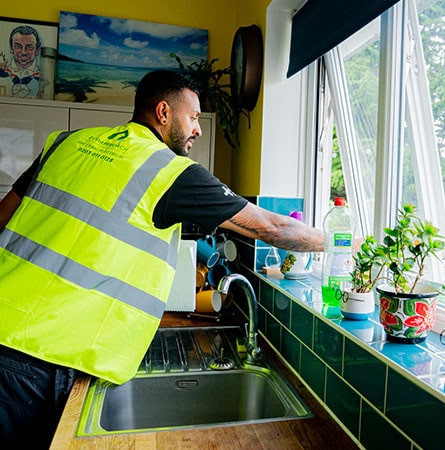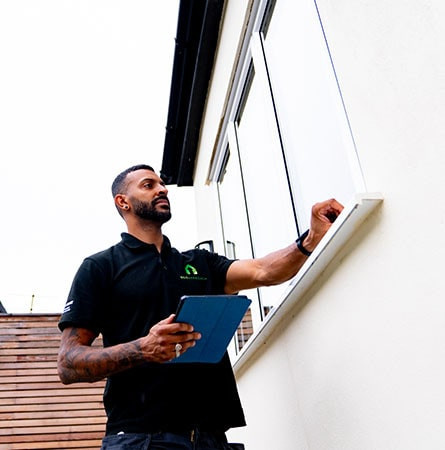EPCs: The Ultimate Guide
An Energy Performance Certificate (EPC) measures the energy efficiency of a building that’s for sale or rent on a scale from A (most efficient) to G (least efficient). This report also informs people of recommended energy improvements and cost-effective ways to have a better rating.
It serves as a legal requirement for landlords and is essential for potential buyers or tenants. If a property has a low rating, then the buyer or tenant will know that the energy bills for that property could be high.
Furthermore, a minimum rating of C or above is required for landlords by 2025. Failure to provide a valid EPC may cause you to pay a fine of up to £5,000. They should also have an updated EPC when renting out their property. EPCs are only valid for ten years to have a consistent report of how efficient the property is.
Residents are also more likely to rent a property if they know it has a high energy rating and is well insulated, saving them more money on monthly cooling and heating costs.
If you’re a homeowner, you can get a better return on your investment by opting for solutions where your home has a good energy rating, allowing you to save on your energy bills.
Improving your EPC rating can also help add more value to your property if you wish to sell it in the future, as homes with high energy ratings are more in demand.
An accredited energy assessor will conduct a visual inspection of your property for an EPC for domestic properties. They will take a measured survey, photographs, and calculate the EPC rating by recording lights, windows, heating, and radiators.
To carry out the assessment properly, the assessor will access every part of the property and check things like how much insulation there is, the size and construction type of the property, the heating and lighting systems, and ventilation.
Here are other factors checked by EPC assessors:
The EPC assessor will check the number of fixed lighting and low-energy light bulbs in the house, and find out what percentage of the lights are energy-efficient. There’s a wide range of LED lights available, and opting to use them than the usual halogen bulb will improve your home’s efficiency.
Domestic EPCs input lighting in a building by counting the number of total lights and the total number of energy-efficient lights. It makes a difference in the final energy rating by one or two points if you go from old lighting to a new efficient lighting system. A single point makes all the difference in aiming to boost your EPC rating.
Windows have a big impact on a property’s energy efficiency. The more glazing your windows have, the higher the EPC rating will be. Double glazed windows feature a sealed air gap that helps minimise noise and acts as an added layer of insulation. It helps lower the amount of heat that escapes and keeps your home at a more comfortable temperature.
From an energy-saving perspective, glazed windows are worth the investment as double glazing can last up to 20 years. Upfront costs may be high depending on the energy rating you aim for, but the overall return on investment can save you up to hundreds of pounds annually. You’ll also have a warmer and more sustainable home that will last a long time.
The heating system is the largest part of the calculation for your EPC rating. The assessor will take note of the time and heat controls of thermostats, thermostatic radiator valves, and other forms of heating like log, coal, or gas.
The assessor will have a look at the loft and determine if any insulation is needed and how much. The usual recommendation is to have 270mm insulation at the joists. They will also check the type of wall that divides your property from the neighbours.
You can improve your energy rating by having insulation like open-cell spray foam. This area is where heat loss usually occurs, and uninsulated lofts can lose about 33% of heat.

Assessors usually take measurements and photographs of the house as they are regularly audited to ensure that they are producing high-quality assessments. They are also likely to ask you several questions about the property’s construction, such as any additional work done, heat recovery technology, electricity metre readings, or cavity wall insulation.
The EPC will also come with a recommendation report that features several pieces of advice that can help make your property more energy-efficient. The assessor’s suggestions may include:

An EPC report provides energy efficiency and environmental impact ratings. It also estimates lighting, carbon dioxide emissions, energy use, and heating annually with the potential costs for each. It also offers some measures to improve energy efficiency rating, the costs associated with installation, and how much you’ll be able to save per year.
You can also gauge the energy efficiency of the property through the colour or grading. Some properties may require small changes like the replacement of light bulbs for more efficient ones. There are times that bigger changes are required, like the installation of solar panels. If you’re a landlord and the property is below an E rating, then you have to make improvements for your tenants.

The government's Standard Assessment Procedure (SAP) is used to give your property a numerical score that is divided into bands:
These are built to stricter building codes, so newer homes usually have a higher EPC compared to older properties. Most homes in the UK are rated D. If your property has an EPC score of 69 or more, it’s considered above average in terms of energy efficiency.
The environmental impact rating is the measurement of the home’s impact on the environment through carbon dioxide emissions. The rating is based on the performance of the building’s fixed services like lighting and heating. The higher the rating, the lower impact it has on the environment.
Twenty per cent of UK homes’ carbon emissions contribute to climate change. EPCs can help homeowners lower the environmental impact of their homes through the recommendations provided. About £300 per year can be saved in fuel bills if gas is used more efficiently.
EPC calculation features two main factors:
It focuses on how energy is used in the home by tracing potential sources of energy loss. For instance, to get a good rating, the floor, walls, and roof should have good insulation, so the heat remains in the household.
Windows and heating systems are also some factors that are also covered by the assessment, as well as lighting and electrical items. Every segment has a score that depends on its condition and efficiency.

Easily arrange an Energy Performance Certificate assessment with us. You can do it through the website or phone, and you also have the convenience of tracking your order online. You’ll have highly qualified assessors who will present you with an EPC at a competitive price.
Schedule an appointment by calling us today at 0203-397-8220 or by filling out our online form.